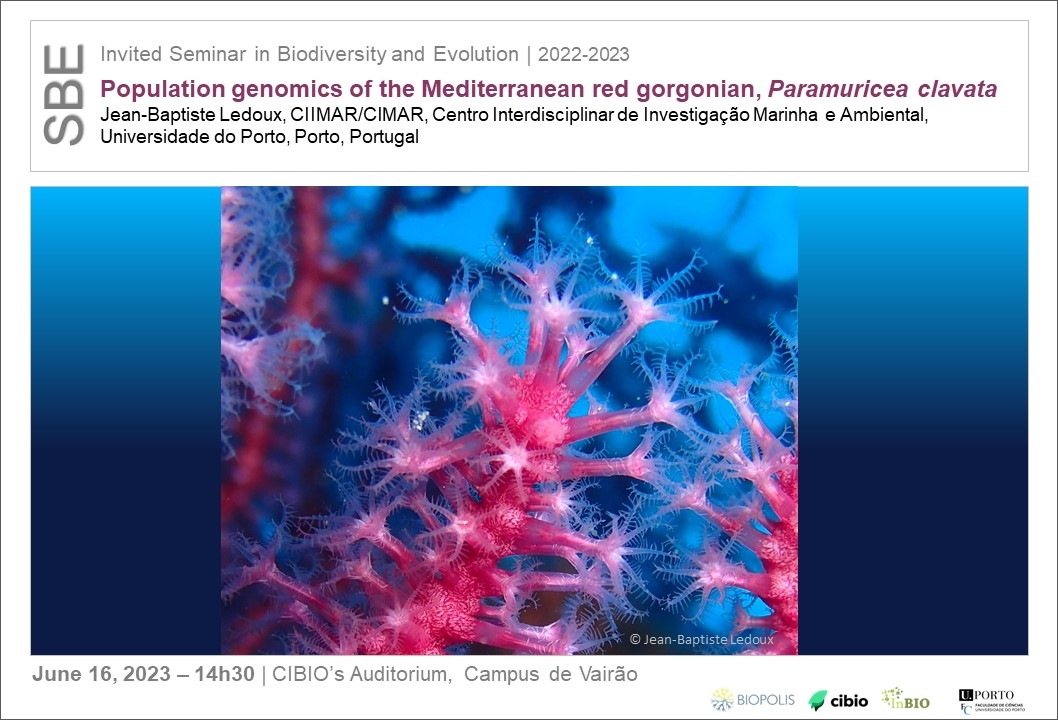Population genomics of the Mediterranean red gorgonian, Paramuricea clavata
Event
INVITED SEMINAR IN BIODIVERSITY AND EVOLUTION
June 16th, 2023
Jean-Baptiste Ledoux, CIIMAR/CIMAR, Centro Interdisciplinar de Investigação Marinha e Ambiental, Universidade do Porto, Porto, Portugal | 14h30 | CIBIO’s Auditorium, Campus de Vairão

INVITED SEMINAR IN BIODIVERSITY AND EVOLUTION
Intraspecific genetic diversity is a fundamental level of biodiversity. The need to focus conservation efforts on genetic diversity has been recently strengthened, owing to the potential link between genetic diversity and adaptive capacities to climate change. The Mediterranean red gorgonian, Paramuricea clavata is characterized by low population dynamics (few mm per year), late sexual maturity (10-12 years of age) and restricted dispersal abilities (10s of m). This species harbors a key ecological role as habitat-forming species in biodiversity rich coralligenous communities. In the last 20 years, P. clavata has been recurrently impacted by dramatic mass mortality events linked to marine heat waves. These events induced tissue necrosis potentially driving individuals to death. In this context, the evolutionary trajectory of P. clavata is questioned with potential negative impacts on associated coralligenous communities. Interestingly, field surveys conducted during the MMEs suggest that individuals of P. clavata were differentially affected by tissue necrosis with individuals potentially less sensitive to thermal anomalies. This result opens the possibility to develop warming-resilient restoration actions. Previous studies based on microsatellites provided important insights regarding for instance the restricted connectivity of the species or the potential link between genetic drift and sensitivity of populations to thermal stress. Yet, various issues remain to be solved to develop restoration actions. For instance, little is known regarding the strength of adaptive divergence among populations. The occurrence of genetic factors driving the differential response among individuals observed during mortality events remain to be tested. Here, I will address some of these issues by presenting the results of a study combining a trans-regional thermal stress experiment involving 12 populations from 5 regions of the Mediterranean and whole-genome resequencing targeting a subset of 120 individuals. I will discuss the potential implications of these results for the conservation of the species.
Following my PhD (2010, France), I got several postdoctoral and researcher contracts between the Institute of Marine Sciences (ICM-CSIC) in Barcelona (Spain) and the Interdisciplinary Centre of Marine and Environmental Research (CIIMAR) in Porto (Portugal). In 2022, I started a CEEC as Auxiliary Researcher at CIIMAR. Most of my research since my PhD is involved in the conservation biology of Mediterranean octocorals impacted by climate change. I work mainly on the red coral, Corallium rubrum and the red gorgonian, Paramuricea clavata, two habitat-forming octocorals impacted by mass mortality events linked to marine heat waves. In these species, I develop a multidisciplinary approach at the interaction between population genetics and experimental ecology in order to: i) characterize the patterns of genetic diversity within species; ii) infer the eco-evolutionary processes shaping and maintaining these patterns and iii) promote scientifically based conservation policies. Besides, I am currently leading two projects dedicated to the de novo sequencing of reference genomes in different octocorals from the Mediterranean and the Atlantic belonging to the genus Eunicella, Alcyonium and Corallium.
[Host: Cátia Monteiro, Marine Ecology, Diversity and Change - MarChange]
